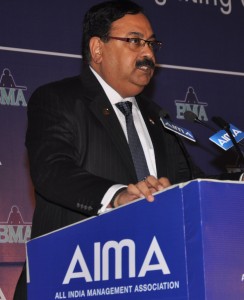Change being the important component of the ecosphere, clearly the challenges in front of us multiply. I have spent 36 years of my life as an oil man. A variety of factors contribute to the pricing of gasoline in the Unites States. These factors include world-wide supply, demand & competition in crude oil industry, taxes, regional differences in access to gasoline supplies and environmental regulations. The other factors are: speculations in oil futures, geopolitical risks, technology premium, pressure from competing fuel and other soft issues like human rights, ethical labor practices, responsible investments and anti-corruption practices.
How to deal with the uncertainty & the change in the economy? One way is to look at the past trends and get ready for the future. Another way is to use a lot of algorithms and work on a model for the problem with variety of inputs that produce probability based outcomes. This needs a lot of number crunching and supercomputers can be used for that. Another concept uses fuzzy logic.
There are a lot of options available to forecast the future. Each one of these models to forecast the future works well and we still have to deal with questions attached to each one of these tools. Granting the practitioner one of these forecasting tools, the intellectual license and the seriousness of their enterprise, the apex manager of an oil & gas company never the less dwells in a miasma of half- truths, irregular information, unpredictable outcomes and confusing options. They have to take decisions today that will have repercussions in the future. Also the manager has to work out solutions to reshape& re-equip his organisation with reference to these changes, so that they can work effectively in the highly competitive business environment.
The important question that arise in this uncertain business environment is what other gas sources are available, are they available with us or others? And if they are available with others, can they be accessed? The hydrocarbon business is inherently risky but risk is acceptable part of our industry and we should be used to it. The question that begs an answer is that are the apex managers of our oil & gas industries who are super managers with an uncanny ability to navigate through nebular boundaries.
Typical strategies to hedge risk on account of this are to enter relatively stable businesses and integrate vertically or horizontally as to even off business cycles. However most of us have realized that one can perform well in a specific field. Today it is better to invest more & more in the learning, so the least will remain in the unknown domain. Let us call this super-specialization. It takes years to achieve this and it requires focus and sustainable investments to make it happen.
To illustrate this Brazil company Petrobas invested in heavy water technology and its management and it is now paying it rich dividends Another aspect that provide hydrocarbon industries leverage to confidently handle uncertainty is on account of our operational business models based upon a large and complex chain of niche technology and service providers which enables business risk to be shared collectively by the entire chain. This model has also enabled us to maintain robust investments in R& D which can promote innovation and new technology development. A three tier collaborative model between operators, service providers & academia has evolved which insures development of new technology under an equitable risk sharing environment in Oil & Gas industry.
The time required for new technology to be accepted commercially is more than a decade, so it requires a large upfront investment that would pay dividend much into the future. In the end I want to say that fossil fuels will continue to be the dominating source for global energy requirement. Global demand for energy is expected to be triple by 2050 as the developing economy are following a historical pattern of development & the biggest challenge would be to provide this energy supply in a sustainable and environmental friendly manner.
The above article is an excerpt from the speech delivered by Mr. Sudhir Vasudeva, CMD, ONGC at AIMA’s 39th National Management Convention which was held in September 2012.




Get the team to establish a simple vision and strategy, focus on emotional and creative aspects necessary to drive service and efficiency
Inspire people to move, make objectives real and relevant.
Foster and encourage determination and persistence – ongoing change – encourage ongoing progress reporting – highlight achieved and future milestones.
Great thoughts! We need to eb reeady to face the changes and prepare ourselves for that right now instead of thinking about it in future..
I found this article quite apt.. as it specifially focussed on the niche area of Oil & Gas industry.
Employee empowerment has played a crucial role in these recognizable organizations
Better employee performance, as everyone steps up for fear of being left behind
The company believes in a responsible workforce and limits the emphasis on formal organizational structure, entrusting decision-making powers to the individual worker or management committees